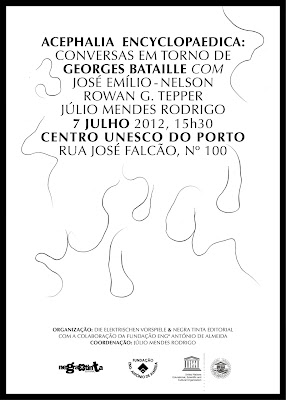The Truth of Transience: A Philosophy of Happiness
 I.
I.
I have never believed in anything, not even and much less myself. I have always felt as though selfhood, identity, kept me, keeps us, in fetters, shackled to the lie of transcendence. I lied, just now. I believed in deliverance, escape, in the pleroma of the apocalypse of love.
II.
Reflecting upon the man I've become and the stark contrast in which I stand to my past, I can only find it insufferably presumptuous to speak of myself in the present tense. Even today I have not ceased to live ahead of myself. Whereas you, my friends, can see me as I am, I can only see myself within images of the past, in the reflections of memory's mirror.
III.
When I write, I write as an author of quotations without context, excerpts drawn from non-existent books.
IV.
Happiness in love is elusive for the very same reason as its simplicity: one must affirm (to eternity) that nothing is necessary, and that the origin of love lies in absolute, radical contingency.
V.
The Analyst: You know, love is just a Romantic fantasy, a mask for our every retrogression into primal, neurotic behavior. These aggressive, self-destructive drives masquerade as expressions of a noble emotion, when in reality, they respond to the trauma of intimacy, the anticipatory grief of knowing that the beloved will one day disappear. On occasion we attain mastery, only by becoming agents of the feared dissolution.
The Analysand: Can't it be otherwise? Can't love inspire progress?
The Analyst: Why, then, is it you on the couch and not I?
VI.
Why must we reproach ourselves for ephemeral happiness as it recedes into the past? Wouldn't this amount to sour grapes on the part of my present existence? 'I must have been mistaken. Had I been or had reason to be happy it would have lasted.' In so doing we forget that transience is indissociable from the very idea of happiness.
...to love to let go.
VII.
Hope is
impossible. Despair is doubly
impossible. To genuinely let go:
impossibility raised to the power of infinity.
VIII.
At that moment when at last I felt at home in the cosmos, a multitude of previously unseen stars illuminated the sky.
IX.
Perhaps every turning point is in accompanied by a palpable uncanny aura. I can
feel the coexistence of what was and what will be in the now.
How to be in the world, to unite my time into a now?
 In (Our) Time:
In (Our) Time:
I.
The non-identity of self and self is time itself – without which we could not exist. Existence is neither eternal, unchanging Being, nor bound, teleologically, to absolute annihilation, eternal non-being. It is rather their unending, non-dialectical synthesis: the stream of Becoming.
Experience does not admit of non-existence, only being-in-time: becoming. genesis and phthora, birth and death, the passage of time: none refute existence. Universal transience and impermanence refute only our fantasies of eternal self-identity – fantasies tantamount to suicidal ideation.
II.
Nostalgia is an addiction to the past, to that which is not - or is no longer. It is the apotheosis of neurosis.
III.
Ennui is a lack of faith in the reality of the future, which makes the present recur eternally without change: the prison of time.
IV.
The time of hell is not, as Walter Benjamin wrote, the time of Eternal Return; it is the timeless time of the endless end.
V.
Absolute zero: a juxtaposition that signifies the unity of being and nothingness and the final kenosis of Spirit in Time
Marx says that historical events are subject to repetition, they come first as tragedy, then as farce. What Marx left out is that, when events recur thrice, they then come in drag.
VII.
Does the rejection of anthropocentrism (and the Copernican revolution in general) necessarily entail relegating humanity to utter insignificance, that is to say: nihilism?
VIII.
Skepticism that is not skeptical of itself is called nihilism.
IX.
Unknown shores: almost in sight
The felt presence of the unforeseen
Unforeseeable yet already present
Optics of the unconscious
Blindsight.
What power has the "light of truth" over blind Tiresias?
[Check out some of the books, albums, and soon movies produced by Mythos Media and our various media partners.]
.jpg)


























